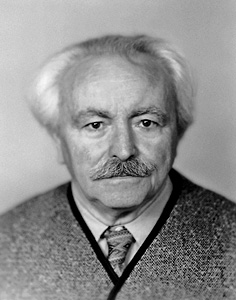Loading AI tools
Mikhail Davidovich Natarevich (Russian: Михаи́л Дави́дович Натаре́вич; September 29, 1907 – February 23, 1979) was a Soviet, Russian painter who lived and worked in Leningrad; he was a member of the Leningrad Union of Artists,[1] and was regarded as one of the brightest representatives of the Leningrad School of Painting.[2]
Mikhail Natarevich | |
|---|---|
 | |
| Born | (1907-09-29)September 29, 1907 |
| Died | February 23, 1979(1979-02-23) (aged 71) |
| Education | Repin Institute of Arts |
| Known for | Painting |
| Movement | Realism |
Mikhail Davidovich Natarevich was born September 29, 1907, in Vitebsk, a small Belarusian town, has gone down in the history of the 20th-century art world with Chagall and Malevich.
Natarevich started his artistic education in Vitebsk at the art school of Yehuda Pen, whose students included Marc Chagall, Osip Zadkine and Lazar Lissitzky.
In 1934 Natarevich came to Leningrad and joined the painting department of the Leningrad Institute of Painting, Sculpture and Architecture. He studied with Semion Abugov, Alexander Savinov and Mikhail Bernshtein.
In 1940 Natarevich graduated from Leningrad Institute of Painting, Sculpture and Architecture in Boris Ioganson personal art studio. His graduation work was a historical painting named Kotovsky, dedicated to the legendary hero of the Civil War in Russia.[3]
From 1941 to 1945 Natarevich served in the Great Patriotic War as a member of the Red Army.
Since 1941 Michael Natarevich has participated in Art Exhibitions. He painted portraits, genre and historical paintings, landscapes, worked in oil and tempera painting. Solo Exhibitions by Michael Natarevich were in Leningrad (1981) and Saint Petersburg (2008).
Natarevich was a member of the Leningrad Union of Artists since 1946.
Mikhail Davidovich Natarevich died on February 23, 1979, in Leningrad in his seventy-second year. Paintings by Natarevich reside in the State Russian Museum and in art museums and private collections in Russia, China, Israel, the US, England, Japan, and throughout the world.
Seamless Wikipedia browsing. On steroids.
Every time you click a link to Wikipedia, Wiktionary or Wikiquote in your browser's search results, it will show the modern Wikiwand interface.
Wikiwand extension is a five stars, simple, with minimum permission required to keep your browsing private, safe and transparent.
